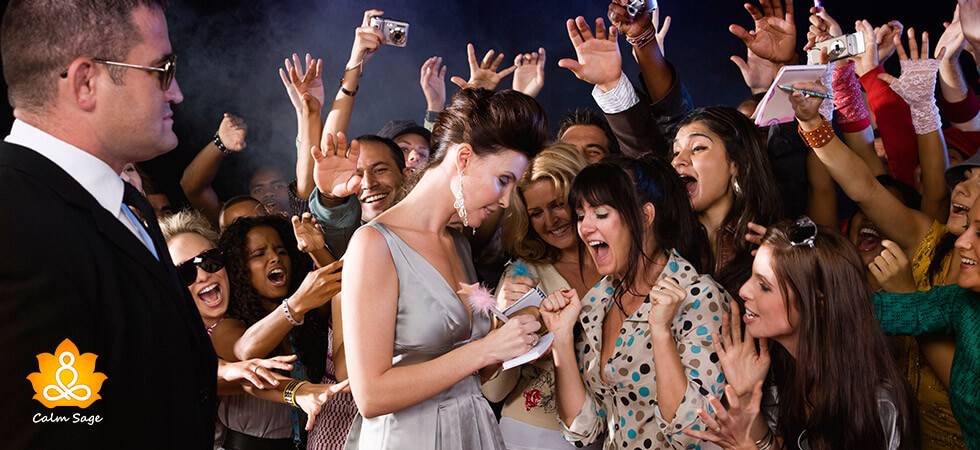Hey there, reader. Remember that time when you were glued to your phone, refreshing a celebrity’s Instagram feed just to catch a glimpse of their latest vacation or outfit? I sure do. Back in my teen years, I had this massive crush on a pop star—posters on the wall, playlists on repeat, the whole nine yards. It felt exciting, like a harmless escape from homework and awkward high school dances. But as I’ve grown older and dived into the psychology behind it, I’ve realized there’s more to this fascination than meets the eye. Celebrity worship isn’t just about being a fan; it’s a spectrum that can range from fun chit-chat to something that seriously messes with your head. In this deep dive, we’ll unpack the three main types, why they happen, and what it all means for our everyday lives. Stick around— you might see a bit of yourself in here, and that’s okay. We’re all human, after all.
What Is Celebrity Worship?
Celebrity worship goes beyond casual admiration—it’s that intense pull toward famous folks where their lives start blending into yours, even if they’ve never heard of you. Think of it as a one-sided relationship fueled by media, social feeds, and our own imaginations. Psychologists describe it as a form of parasocial interaction, where we feel connected without any real back-and-forth. But when does it cross from enjoyable to obsessive? That’s where research steps in, showing it’s not always harmless fun.
The Roots of Celebrity Worship Research
This whole idea didn’t pop up overnight. Back in the early 2000s, as tabloids exploded and reality TV took over, experts like Lynn McCutcheon started noticing adults getting hooked on celeb gossip just like kids do. They created tools like the Celebrity Attitude Scale to measure it, revealing patterns that link our brains’ need for belonging to this star-struck behavior. Fast-forward to today, with social media cranking it up, and studies show it’s on the rise—making us question if we’re evolving or just scrolling our way into obsession.
Why Do We Worship Celebrities Anyway?
Picture this: You’re having a rough day, and bam, your favorite actor posts a motivational quote that hits home. It’s like they’re speaking directly to you, right? That’s the hook. Our brains crave role models, and celebs fill that void with their glamour and success stories. But dig deeper, and it’s often about escaping our own realities—loneliness, identity struggles, or just plain boredom. Humor me here: If aliens landed and saw us crying over a stranger’s breakup, they’d think we’re nuts. Yet, it’s wired in us, a mix of evolution and modern media magic.
The Three Types of Celebrity Worship Explained
At its core, celebrity worship isn’t black-and-white; it’s a sliding scale. Researchers broke it down into three levels based on how it affects your thoughts, feelings, and actions. Each builds on the last, like levels in a video game where the stakes get higher. We’ll break them down one by one, with real-world examples to make it relatable. Trust me, recognizing these can be eye-opening.
Entertainment-Social: The Fun, Social Side
This is the entry-level stuff, where celebs are just entertainment fodder. You chat about them with friends, follow their trends for laughs, and maybe join a fan group online. It’s light-hearted, like bonding over a shared hobby. No big deal, right? But even here, it can sneakily influence your self-image if you’re comparing too much.
Think of it as the “water cooler” worship—harmless chit-chat that spices up life. I once spent a whole coffee break debating a singer’s new album with coworkers; it was bonding gold. Yet, studies show this level links to extraversion, making outgoing folks more prone to it.
Intense-Personal: When It Gets Emotional
Now we’re cranking it up. Here, feelings run deep—you might feel like the celeb is your soulmate or that their wins are yours too. It’s compulsive, with constant thoughts bubbling up uninvited. This level hits about 20% of people, often tying into personal voids like low self-esteem.
It’s that emotional tug that can inspire but also drain you. Remember my teen obsession? It bordered here when I’d daydream about meeting them—it felt real, almost comforting during tough times. But experts warn it correlates with anxiety and neurotic traits, turning admiration into a crutch.
Borderline-Pathological: The Risky Edge
At the top, things turn obsessive. You’d do wild stuff for your idol, like illegal favors or blowing cash on their used napkin (yep, that’s a thing). Only 3-5% reach this, but it’s linked to dissociation and fantasy proneness, blurring reality.
This is where it stops being cute and starts harming. I’ve heard stories of fans stalking celebs, thinking it’s love—heartbreaking and dangerous. It often stems from deeper issues like depression, making professional help a must if you’re there.
Comparing the Three Types: A Quick Breakdown
To make sense of it all, let’s lay it out side by side. This table highlights key differences, so you can spot where your own habits might fit.
| Type | Intensity Level | Key Behaviors | Mental Health Links | Prevalence |
|---|---|---|---|---|
| Entertainment-Social | Low | Discussing celebs, following for fun | Extraversion, minor self-image dips | Common |
| Intense-Personal | Medium | Deep emotional ties, constant thoughts | Anxiety, depression, neuroticism | ~20% |
| Borderline-Pathological | High | Obsessive actions, fantasies | Dissociation, psychoticism | 3-5% |
See how it escalates? The Absorption-Addiction Model explains this progression—like building tolerance to a drug, you need more to feel that high.
Pros and Cons of Celebrity Worship
Not all worship is bad; it can motivate us. Let’s weigh it out honestly.
Pros:
- Sparks creativity (e.g., fans starting art inspired by idols).
- Builds community through fan events.
- Offers positive role models for goals like fitness or charity.
Cons:
- Leads to unrealistic expectations, fueling dissatisfaction.
- Can isolate you from real relationships.
- At extreme levels, risks mental health breakdowns or even legal troubles.
Balance is key—enjoy the pros without the pitfalls.
How Celebrity Worship Affects Teens and Young Adults
Teens are prime targets, with brains still wiring up identity and belonging. My story? It helped me explore who I was, but for some, it amplifies body image woes or loneliness. Studies show girls especially link intense worship to poor self-esteem, pushing cosmetic surgery thoughts.
Social media amps it, turning casual follows into 24/7 obsessions. Parents, chat openly—guide that energy toward real hobbies.
The Dark Side: When Worship Turns Pathological
Ever felt heartbroken over a celeb’s scandal like it was your own drama? That’s the edge. Pathological worship ties to depression and anxiety, with some folks dissociating—losing touch with reality. It’s not causal, but intertwined, like a vicious cycle.
One chilling example: Stalkers believing in delusional bonds. If this rings true, seek therapy—it’s a signpost, not a sentence.
Celebrity Worship in the Social Media Era
Instagram, TikTok— they’re worship accelerators. Direct “access” fools us into thinking it’s mutual. I laugh now at how I’d like every post, hoping for a notice. But research shows this boosts addiction, with likes mimicking dopamine hits.
Tip: Set screen limits. Redirect to local heroes or personal growth apps.
People Also Ask: Common Questions Answered
Based on what folks are searching, here are real questions from Google about this topic, with straightforward answers.
- What are the three levels of celebrity worship? They’re entertainment-social (fun and chatty), intense-personal (emotional obsession), and borderline-pathological (risky behaviors), per the Celebrity Attitude Scale.
- Is celebrity worship a mental disorder? Not officially in the DSM-5, but extreme forms resemble obsessive-addictive issues and can signal underlying problems like anxiety.
- Why do people worship celebrities? It fills needs for belonging, escape, and inspiration, rooted in our social animal instincts, amplified by media.
- How does celebrity worship affect mental health? Mild forms are fine, but higher levels link to stress, low self-worth, and even dissociation—seek balance.
- Can celebrity worship be positive? Yes, if it motivates healthy changes, like adopting a star’s workout routine without obsession.
Where to Get Help If Worship Feels Overwhelming
If you’re nodding along, thinking “that’s me,” don’t panic. Navigational wise, start with therapists specializing in addiction or media psychology. Sites like Psychology Today list pros near you. For teens, school counselors are a low-key entry.
External link: Check out Verywell Mind’s guide on parasocial relationships for more.
Best Tools and Resources for Understanding Celebrity Worship
Transactionally speaking, grab these to assess and manage:
- Celebrity Attitude Scale: Free online quizzes based on it—test your level.
- Books: “Celebrity Worshippers: Inside the Minds of Stargazers” for deep insights.
- Apps: Journaling ones like Day One to track thoughts and redirect energy.
- Therapy Tools: CBT workbooks for obsessive patterns.
Internal link: If you’re on our site, see our piece on building real connections.
Breaking Free: Personal Stories of Moving Past Worship
Let me share a buddy’s tale—he was deep into a rapper’s life, mimicking style and slang, until it tanked his grades. Hitting rock bottom, he joined a hobby club, swapped feeds for friends. Now? He’s thriving, with celebs as background noise. Emotional, huh? It shows change is possible with self-awareness.
Humor alert: He jokes his wallet thanks him—no more merch splurges!
The Broader Impact on Society
Celebrity worship shapes culture—think trends, politics, even charity drives. But it also breeds inequality, with stars seeming untouchable. As a society, promoting diverse role models helps dilute the obsession.
FAQ: Your Burning Questions Answered
Here are some real user queries with clear, helpful responses.
- What causes celebrity worship syndrome? Often, it’s a mix of low identity, media exposure, and seeking fulfillment— the Absorption-Addiction Model nails it.
- How can I tell if my celebrity admiration is unhealthy? If it interferes with daily life, relationships, or leads to compulsive behaviors, it’s time to reflect.
- Does celebrity worship affect body image? Absolutely, especially in intense levels, linking to cosmetic surgery desires and poor self-perception.
- Is there treatment for extreme celebrity worship? Therapy like CBT helps rewire thoughts; support groups for fans can normalize it too.
- How has social media changed celebrity worship? It’s made it more accessible and addictive, increasing rates over the last two decades.
Wrapping It Up: Finding Balance in a Star-Struck World
We’ve journeyed through the three types, from casual fun to risky obsession, with stories, laughs, and hard truths along the way. Celebrity worship? It’s part of being human in our connected age. But remember, your life is the real blockbuster. Channel that energy into your passions, real bonds, and self-growth. Next time you scroll, ask: Is this adding joy or stealing it? Thanks for reading—drop a comment if this hit home. Stay grounded, folks.
(Word count: 2,756)





